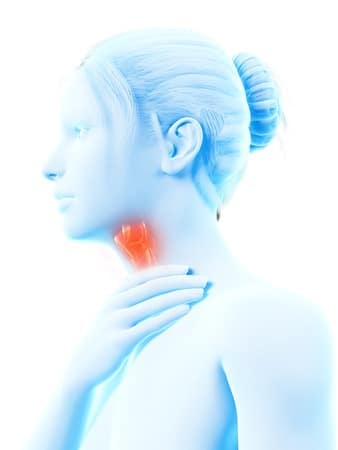It has been evidenced that changes in thyroid hormone is associated with mood, neuropsychiatric and cognitive changes (1). Thyroid hormone receptors are widely distributed in the brain including in the emotional center of the brain (limbic system structure), and studies indicate that thyroid hormone interacts with the neurotransmitter system (Norepinphrine, 5-HT and dopamine; 2-6) that are believed to play a major role in the regulation of mood and behavior. Thyroid hormone has show to be involved in the reduction of the sensitivity of 5-HT1A receptor (this is where the neurotransmitter 5-HT binds in the brain) in the raphe nuclei and increase in 5-HT2 receptor sensitivity (5). Thyroid hormone also interacts with dopamine post-receptor and signal transducing processes, as well as gene regulatory mechanisms. Several studies have evidenced that blunted thyroid stimulating hormone (TSH) response to thyroid releasing hormone (TRH) has been found to be associated with depression (7-10). Additionally, lower concentration of cerebral spinal fluid (CSF) transthyretin have been found in depressed patients than in healthy controls despite normal peripheral blood thyroid hormone measure.
The most frequently occurring thyroid diseases for adults are autoimmune disorders (Hashimoto’s and Graves Disease). For example, Hashimoto’s encephalopathy may be an independent risk factor for depression or cognitive impairments (11-14) and can mimic neurological disorders. Graves Disease, has also been shown to cause secondary complications including, 1) cardiovascular complication; 2) decreased attention/concentration; 3) sleep disturbance and irritability. Both hypothyroidism and hyperthyroidism are associated with changes in mood and intellectual performance and severe hypothyroidism can mimic melancholic depression and dementia (15-17). Neurocognitive impairments are usually reversed rapidly by treatment and severe cases of hypothyroidism may result in irreversible dementia if untreated (18-19).
Cognitive symptoms are often reported in with patients with hypothyroidism. These symptoms can range from minimal to severe changes in general intelligence to reports of defects in psychomotor speed, visual-spatial skills, and memory (15, 20-24). Studies have shown that the memory disturbances may be attributed to specific retrieval deficits and not attention-related deficits (24-27). Other cognitive symptoms that have shows less of an impact include, motor skills, language, inhibitory efficiency, and sustained attention (21-24).
The bottom line is that if you or your loved ones have a diagnosis of thyroid disease or have genetic loading for these diseases and are experiencing psychological difficulties, including changes in mood and/or cognitive function please get your thyroid function evaluated by your primary care physician or an endocrinologist. The chances are that the mood and cognitive symptoms can be reversed when the thyroid disease is properly treated. Of course, if the emotional difficulties are interfering with your social, occupational and personal functioning, please seek assistance from a mental health professional.
Etiology and Types of Thyroid Disease
Hypothyroidism:
-
Thyroiditis- is an inflammation of the thyroid gland.
– postpartum thyroiditis- occurs in 5-9% of women after giving birth
– drug-induced thyroiditis
– radiation-induced thyroiditis
– acute infection thyroiditis
-
Hashimoto’s thyroiditis- is a painless disease of the immune system that is typically hereditary.
-
Iodine deficiency-Because Iodine is used by the thyroid to produce hormones a lack of this element can impact thyroid hormone production. Although prevalent before the 50s in the US, iodine deficiency has been nearly wiped out by the use of iodized salt.
-
Congenital thyroid disease- affects 1 in 4,000 newborns. If the problem is not corrected, it can result in permanent mental retardation and growth failure.
Hyperthyroidism
-
Grave’s Disease- also an autoimmune disease and is the most common cause of hyperthyroidism. It is believed that Graves’ disease is caused by an antibody that mimics thyroid stimulating hormone and continues to stimulates the thyroid too much. This overstimulation causes the excess production of thyroid hormone. Common in young to middle-aged women. Also tends to run in families.
-
Toxic nodular goiter (also knows as multinodular goiter)- Condition in which 1 or more nodules of the thyroid becomes overactive. Cause unknown
-
Thyroiditis- Thyroiditis also causes temporary hyperthyroidism, usually followed with hypothyroidism.
REFERENCES
1. Bauer, M., Goetz, T., Glenn, T., Whybrow, P.C., The Thyroid-Brain Interaction in Thyroid Disorder and Mood Disorder. Journal of Neuroendocrinology 2008; 20, 1101-1114
2. Whybrow PC, Prange AJ Jr. A hypothesis of thyroid-catecholamine- receptor interaction. Arch Gen Psychiatr 1981; 38: 106–113.
3. Marwaha J, Prasad KN. Hypothyroidism elicits electrophysiological nor- adrenergic subsensitivity in rat cerebellum. Science 1981; 214: 675– 677
4. Gordon JT, Kaminski DM, Rozanov CB, Dratman MB. Evidence that 3,3¢,5-triiodothyronine is concentrated in and delivered
from the locus coeruleus to its noradrenergic targets via anterograde axonal transport. Neuroscience 1999; 93: 943–954.
5. Bauer M, Heinz A, Whybrow PC. Thyroid hormones, serotonin and mood: of synergy and significance in the adult brain. Mol Psychiatr 2002; 7: 140–156.
6. Mason GA, Bondy SC, Nemeroff CB, Walker CH, Prange AJ Jr. The effects of thyroid state on beta-adrenergic and serotonergic receptors in rat brain. Psychoneuroendocrinology 1987; 12: 261–270.
7. Bauer MS, Whybrow PC. Rapid cycling bipolar affective disorders. II. Treatment of refractory rapid cycling with high-dose levothyroxine: a preliminary study. Arch Gen Psychiatr 1990; 47: 435–440.
8. Baumgartner A, Bauer M, Hellweg R. Treatment of intractable non-rapid cycling bipolar affective disorder with high-dose thyroxine: an open clinical trial. Neuropsychopharmacol 1994; 10: 183–189.
9. Jackson IM. The thyroid axis and depression. Thyroid 1998; 8: 951–956.
10. Gyulai L, Bauer M, Bauer MS, Garcia-Espana F, Cnaan A, Whybrow PC. Thyroid hypofunction in patients with rapid-cycling bipolar disorder after lithium challenge. Biol Psychiatry 2003; 53: 899–905.
11. Pop VJ, Maartens LH, Leusink G, van Son MJ, Knottnerus AA, Ward AM, Metcalfe R, Weetman AP. Are autoimmune thyroid dysfunction and depression related? J Clin Endocrinol Metab 1998; 83: 3194–3197.
12. Kuijpens JL, Vader HL, Drexhage HA, Wiersinga WM, van Son MJ, Pop VJ. Thyroid peroxidase antibodies during gestation are a marker for subsequent depression postpartum. Eur J Endocrinol 2001; 145: 579–584.
13. Harris B, Oretti R, Lazarus J, Parkes A, John R, Richards C, Newcombe R, Hall R. Randomised trial of thyroxine to prevent postnatal depression in thyroidantibody-positive women. Br J Psychiatry 2002; 180: 327– 330.
14. Chong JY, Rowland LP, Utiger RD. Hashimoto encephalopathy: syn- drome or myth? Arch Neurol 2003; 60: 164–171.
15. Whybrow PC, Prange AJ Jr, Treadway CR. Mental changes accompanying thyroid gland dysfunction. Arch Gen Psychiatry 1969; 20: 48–63.
16. Whybrow PC, Bauer M. Behavioral and psychiatric aspects of hypothy- roidism. In: Braverman LE, Utiger RD, eds. Werner & Ingbar’s The Thy- roid. A Fundamental and Clinical Text, 9th edn. Philadelphia: Lippincott Williams & Wilkins, 2005: 842–849.
17. Whybrow PC, Bauer M. Behavioral and psychiatric aspects of thyrotoxi- cosis. In: Braverman LE, Utiger RD, eds. Werner & Ingbar’s The Thyroid. A Fundamental and Clinical Text, 9th edn. Philadelphia: Lippincott Wil- liams & Wilkins, 2005: 644–650.
18. Haupt M, Kurz A. Reversibility of dementia in hypothyroidism. J Neurol 1993; 240: 333–335.
19. Davis JD, Stern RA, Flashman LA. Neuropsychiatric aspects of hypothy- roidism and treatment reversibility. Minerva Endocrinol 2007; 32: 49–65.
20. Denicoff KD, Joffe RT, Lakshmanan MC, Robbins J, Rubinow DR. Neuro- psychiatric manifestations of altered thyroid state. Am J Psychiatry 1990; 147: 94–99.
21. Haggerty JJ Jr, Evans DL, Prange AJ Jr. Organic brain syndrome associ- ated with marginal hypothyroidism. Am J Psychiatry 1986; 143: 785– 786.
22. Osterweil D, Syndulko K, Cohen SN, Pettler-Jennings PD, Hershman JM, Cummings JL, Tourtellotte WW, Solomon DH. Cognitive function in nondemented older adults with hypothyroidism. J Am Geriatr Soc 1992; 40: 325–335.
23. Dugbartey AT. Neurocognitive aspects of hypothyroidism. Arch Intern Med 1998; 158: 1413–1418.
24. Burmeister LA, Ganguli M, Dodge HH, Toczek T, DeKosky ST, Nebes RD. Hypothyroidism and cognition: preliminary evidence for a specific defect in memory. Thyroid 2001; 11: 1177–1185.
25. Jaeschke R, Guyatt G, Gerstein H, Patterson C, Molloy W, Cook D, Har- per S, Griffith L, Carbotte R. Does treatment with L-thyroxine influence health status in middle-aged and older adults with subclinical hypothy- roidism? J Gen Intern Med 1996; 11: 744–749.
26. Miller KJ, Parsons TD, Whybrow PC, van Herle K, Rasgon N, van Herle A, Martinez D, Silverman DH, Bauer M. Memory improvement with treatment of hypothyroidism. Int J Neurosci 2006; 116: 895–906.
27. Miller KJ, Parsons TD, Whybrow PC, Van Herle K, Rasgon N, Van Herle A, Martinez D, Silverman DH, Bauer M. Verbal memory retrieval deficits associated with untreated hypothyroidism. J Neuropsychiatry Clin Neu- rosci 2007; 19: 132–136.







